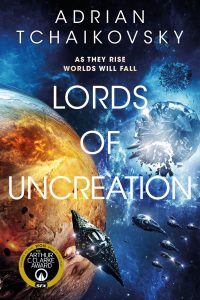Paul Di Filippo Reviews Hella by David Gerrold
 Hella, David Gerrold (DAW 978-0-7564-1657-7, $26, 448pp, hardcover) June 2020.
Hella, David Gerrold (DAW 978-0-7564-1657-7, $26, 448pp, hardcover) June 2020.
Somehow, with the publication of this novel, the twenty-three-year-old wunderkind who created The Trouble with Tribbles (1967) has entered into the fifty-third year of his career, a long, varied, and satisfying one. I myself am not quite sure how this transformation from newbie to Grand Old Man occurred in what sometimes seems, to a reader who was present at every step, the blink of an eye. But I am very grateful that we still have David Gerrold with us in any capacity, even if he’s not still stuffing the grain-laden cargo bays of the Enterprise with voracious fuzzballs.
Hella is part of a sterling tradition in SF: the alien planet colonization adventure. From Simak’s “Beachhead” to Heinlein’s Tunnel in the Sky to Harrison’s Deathworld sequence; from Silverberg’s Downward to the Earth to Tepper’s Grass to Steele’s Coyote saga; from Roberts’s Salt to Tchaikovsky’s Children of Time series to Howey’s Half Way Home, SF has delivered some of its finest moments when chronicling how humanity can adapt to strange and challenging environments. Gerrold does the subgenre proud in two ways. First, in his construction of Hella—its climate, geography, flora and fauna—he exhibits an inventive rigorousness worthy of planet-builder Poul Anderson. Secondly, he has assembled such a rich and authentic cast of characters—starting with our first-person narrator, Kyle Martin—that the novel functions as a top-notch bildungsroman and study of personal interactions in a small, closed community. Winesburg, Ohio, in the stars.
The planet Hella—slightly lower gravity, slightly more oxygen-rich atmosphere—is one of several worlds populated by Earth’s small fleet of colonizing starships. It’s been established for over forty Hella years (intervals longer than a terrestrial sun-circuit.) It’s doing okay, with its few thousand folks leading a pretty secure existence, despite, among other challenges, herds of migrating dinos prone to trample stuff, some toxic plants, and seasonal variations that require separate Summerland and Winterland settlements, with occupancy swapped via hazardous semi-annual migrations of nearly the entire populace. But to the natives, the place has its beauty and charms and potential. A unique society—somewhat communal, somewhat utopian, somewhat survivalist—with its own customs has arisen.
Our viewpoint into this world is the aforementioned Kyle. He’s just a young teenager, but he’s wise beyond his years due to two factors. Although never explicitly named so, Kyle, we soon discern, is on the Asperger’s spectrum, exhibiting all the well-known traits of that neurotype. He finds it hard to process emotions—his own or those of others—is compulsive and obsessional about what he loves, dislikes being touched, has genius-level savant abilities, and finds mental solace in certain tactile stimulations. (You get a hint of all this right away, from a masterful opener in which Kyle rhapsodizes about the soothing effects of long bathing showers.) Since his earliest years, Kyle has had a brain implant to modify his behavior, which also allows him web access—just what he needs, more facts!
Obviously Gerrold is mining or refining some of the same thematic ore he famously used in The Martian Child. But I believe his accomplishments here outdo the earlier performance. Kyle emerges as a deep, non-stereotyped, fascinating individual. Moreover, he is not just some outsider or observer. He is fully integrated, albeit awkwardly, into the community, taking even a pivotal role at times, as we shall see. And Kyle’s natural traits conduce believably towards infodumps and explanatory passages (all smoothly integrated) which solves the classic SF quandary of how to convey necessary facts without stopping the action.
And as if this individuation were not sufficient, Gerrold also digs into gender roles. In the manner of John Varley’s famous riffing on the matter of full-bore, physiologically complete, normalized sex transitioning, Gerrold reveals that Kyle was born female, but switched roles to male as a child. While never heavy-handed or ideologically programmatic, this facet of Kyle’s life lends “nuance” (one of those important words Kyle has a hard time processing) to his portrait, especially as he gets a bit older and starts to fall in love.
So: even given a vivid world and a colorful protagonist, we would not have a complete story. That comes in with Gerrold’s finely tuned plotting. He gives us plenty of pages to get used to the normal routines of Hella before he introduces a couple of sources of conflict. First there’s the nominal bad guy, a certain politician named Layton (with the most obnoxious bully daughter since The Simpsons’s Francine), who has plans to take over the government and impose an authoritarian rule. Then comes the arrival of the Cascade, the last starship from a dying Earth, bearing 1200 colonists. Integrating them is going to be enough of a problem, but it turns out there is someone onboard who is simpatico with Layton and his plans. And there’s another being on the Cascade as well who will prove seminal. Get ready for a mild spoiler, occurring about halfway through the book, but obvious much earlier to any Gerrold fan. The Cascade is “crewed” in part by an AI named HARLIE. Yes, the much-beloved hero of When HARLIE Was One (or his thirteenth-generation descendant) returns in bravura fashion.
Soon the action ramps up to dimensions of The Moon Is a Harsh Mistress (Gerrold’s Heinleinian affections and inspirations—he even deploys the old joke from Astounding‘s glory days about “a ball-bearing mouse trap”—are engagingly upfront) and we get cliffhangers and reversals in a slam-bang finish.
Gerrold has already informed us via social media that he’s at work on the sequel to Hella. We can only begin to imagine what a young adult Kyle, burnished by these adventures, will be capable of.
 While you are here, please take a moment to support Locus with a one-time or recurring donation. We rely on reader donations to keep the magazine and site going, and would like to keep the site paywall free, but WE NEED YOUR FINANCIAL SUPPORT to continue quality coverage of the science fiction and fantasy field.
While you are here, please take a moment to support Locus with a one-time or recurring donation. We rely on reader donations to keep the magazine and site going, and would like to keep the site paywall free, but WE NEED YOUR FINANCIAL SUPPORT to continue quality coverage of the science fiction and fantasy field.







If you are looking for the actual origin of the Tribble, read The Rolling Stones by Heinlein.
Don’t you think Gerrold should finish his war against the Cchtorr series he abandoned 20 years back, leaving fans let down. I won’t be reading anything he ever rights again.